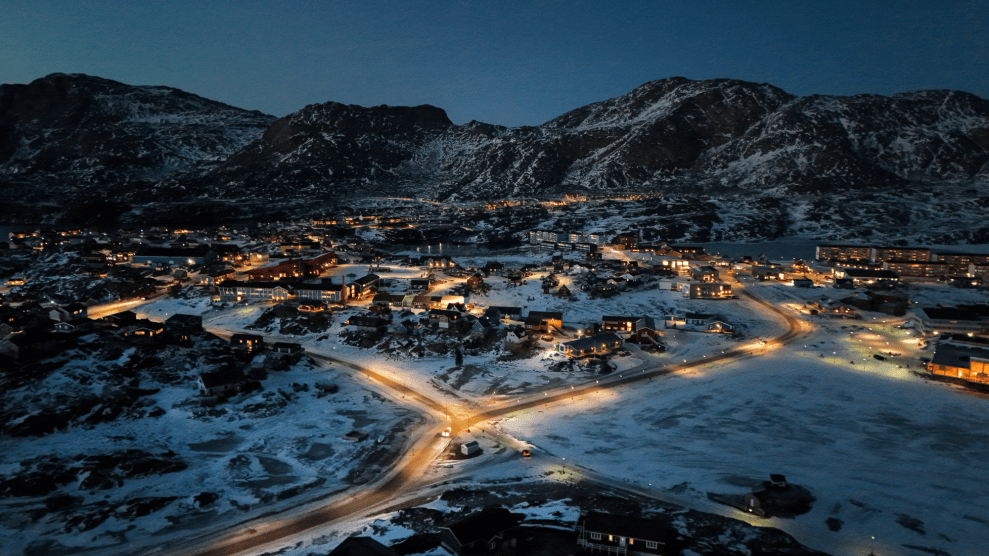Mother Jones: How do we go about moving so much material and so many men from a war zone?
Lt. General William Pagonis: First of all, the first Gulf War was the first war where we ever left a theater of operation and brought stuff home. The big difference between the first Gulf War and this war we’re in right now is that I had no terrorist threat. So I did not have to worry about guarding the equipment and keeping the personnel motivated to be on the watch for terrorist bombings and roadside bombings and missile attacks. I just parked all that stuff in the desert—150,000 wheeled vehicles, 40,000 containers, 2,000 helicopters, about 2,000 tanks—and everybody went home. And then the Department of Defense sent me 6,000 brand new troops who were activated from the ready reserve, a complete fresh crew with nothing to do but clean the equipment and get it ready to be shipped home.
MJ: You were in Kuwait at that time?
WP: We were in Saudi Arabia. We moved everything out of Kuwait, anything in Iraq, and we moved it back to Saudi Arabia. We staged it there.
Cleaning all of this stuff in the middle of the desert was not an easy task. And we did some pretty ingenious things. Some young soldiers figured out how to dig a big hole and put a rubber mat in the hole, build a rack, and the trucks and tanks would drive up on the rack. We would power-hose them down, capture the water in the rubber matting, run it through a reverse-osmosis machine, which purifies water, and reuse the water. Then they would put it on a sterilized truck, drive the truck about 1,200 miles through the desert to the port, where fire trucks would hose everything down again.
Now, with the terrorist threat, I personally would bring everything out through Kuwait. I would get it out of Iraq and stage it in Kuwait. But remember, the troops that are there now are going to be cleaning everything up and they’re tired. They’ve been there a long time. The leadership will be on top of that, I’m positive. They’ll have to make sure people stay motivated and stay focused.
I think it’ll take at least 12 to 18 months to do this. Getting out of Iraq is not the issue; getting out of the theater of operation is. You can drive out of Iraq and nobody’s going to inspect you or anything. But once you get in Kuwait, every piece of equipment, every container, every generator has to be scrubbed and washed and inspected by the Agriculture Department so that we do not bring any hidden diseases back to the United States. Desert sand becomes hardened mud like cement. And all that’s got to be sprayed down or they won’t allow it on ships to get it home.
MJ: How long does it take to wash a tank?
WP: I’d say a good hour per tank, not including the preliminary preparing of the vehicle for the wash rack. Humvees will be less, and of course they’ll get more proficient and more productive as time goes on.
Some stuff should be salvaged and not returned. We shouldn’t bring stuff home that can’t be repaired. It’s amazing how much you can repair, but also some stuff will be left there for the Iraqi forces.
MJ: What will we bring home and what will we leave behind?
WP: I assume a team will be put together to decide what units will be coming home. Because if you don’t bring their equipment home, you’ll have combat brigades with no equipment. And so it’ll have to be a prudent trade-off. It takes a ship 12 to 15 days across the ocean, and then the cargo has to be offloaded in the United States and taken by railcar to the units. The big decision is how much you are going to leave in company for the Iraqis.
My son just got back and he tells me the Iraqi forces are pretty good mechanics but they’ve got to have repair parts or they can’t keep their Humvees running.
MJ: And those will be supplied by the U.S.?
WP: Probably, under foreign military sales.
MJ: How fast did the convoys move in the first Gulf War?
WP: Probably 10-15 miles per hour.
MJ: What kind of security would you suggest?
WP: Helicopters flying over the convoys. You’d have military police and Humvees screening on the sides. If you have to go through a village, if that’s where the road goes, you’d have to go in to secure the road pretty substantially. That’s a lot of work, a lot of time.
MJ: What other logistics are involved?
WP: First of all, to move a control battalion you’d have to set up a timetable. Let’s say the brigade had 1,000 vehicles. Then they would set up convoys of 15 or 20 vehicles called serials. The serials would have a timetable. Every five minutes a serial would be leaving, hitting the road. They’d have to have rest stops along the way. They’d have to have maintenance stops along the way for vehicles that break down. They’d have to have replenishment of water and food and medical. And remember, they don’t have service stations set up like here in the United States. So they’d have to set up all those kinds of things, which is not hard to do but it’s just time-consuming.
MJ: Would contractors take care of a lot of that?
WP: I would hope that they would use third-party contractors, but you still have to have military supervision. That’s how I did it. I used third-party contractors with military supervision, sort of like a paramilitary organization.
MJ: When it comes to big U.S. military bases, do we tear them down or give them to the Iraqis?
WP: Some of the equipment will be taken out—communications equipment, cryptic equipment—but the bases most likely will be turned over to the Iraqis I’d assume, because they’re going to have to take over the security missions. That’s another thing I didn’t have to do. I didn’t have to worry about turning over a base to another force to be able to continue a mission.
MJ: The British turned over some of their bases near Basra and the bases have been all but looted and destroyed.
WP: Well, that happens. That’s sometimes a fact of life. If you turn a base over to the Iraqis, they have to guard it. If they don’t guard it against their own civilians—the civilians, they’re kind of desperate—they’re going to go in there and take plywood and metal, which is worth gold in the desert. That kind of material can build someone a home.
















